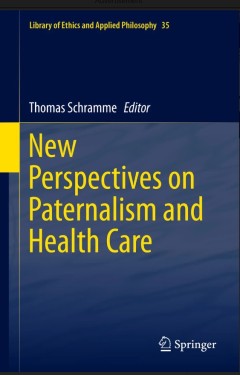Filter by

Bioethics in the age of new media
Joanna Zylinska examines the ethical challenges presented by technology to the allegedly sacrosant idea of the human & makes a proposal for a new ethics of life rooted in the philosophy of alterity.OCLC-licensed vendor bibliographic record.
- Edition
- -
- ISBN/ISSN
- 9780262255141
- Collation
- 1 online resource (xv, 230 pages)
- Series Title
- -
- Call Number
- -

Self-trust and reproductive autonomy
A study of the importance of self-trust for women's autonomy in reproductive health. The power of new medical technologies, the cultural authority of physicians, and the gendered power dynamics of many patient-physician relationships can all inhibit women's reproductive freedom. Often these factors interfere with women's ability to trust themselves to choose and act in ways that are consistent …
- Edition
- -
- ISBN/ISSN
- 0585442711
- Collation
- 1 online resource (xiii, 199 pages).
- Series Title
- -
- Call Number
- -

Encyclopedia of Global Bioethics
This work presents the first comprehensive and systematic treatment of all relevant issues and topics in contemporary global bioethics. Now that bioethics has entered into a novel global phase, a wider set of issues, problems and principles is emerging against the backdrop of globalization and in the context of global relations. This new stage in bioethics is furthermore promoted through the et…
- Edition
- 1
- ISBN/ISSN
- 978-3-319-09483-0
- Collation
- Kedokteran
- Series Title
- -
- Call Number
- 617

Contemporary Bioethics
This book discusses the common principles of morality and ethics derived from divinely endowed intuitive reason through the creation of al-fitr' a (nature) and human intellect (al-‘aql). Biomedical topics are presented and ethical issues related to topics such as genetic testing, assisted reproduction and organ transplantation are discussed. Whereas these natural sources are God’s specia…
- Edition
- 1
- ISBN/ISSN
- 978-3-319-18428-9
- Collation
- Kedokteran
- Series Title
- -
- Call Number
- 617

The Voices and Rooms of European Bioethics
This book reflects on the many contributions made in and to European bioethics to date, in various locations, and from various disciplinary perspectives. In so doing, the book advances understanding of the academic and social status of European bioethics as it is being supported and practiced by various disciplines such as philosophy, law, medicine, and the social sciences, applied to a wide ra…
- Edition
- -
- ISBN/ISSN
- 1317804570
- Collation
- 232 halaman
- Series Title
- -
- Call Number
- 170 VOI

A Critical Examination of Ethics in Health Care and Biomedical Research: Voic…
This book is a critical examination of certain basic issues and themes crucial to understanding how ethics currently interfaces with health care and biomedical research. Beginning with an overview of the field, it proceeds through a delineation of such key notions as trust and uncertainty, dialogue involving talk and listening, the vulnerability of the patient against the asymmetric power of th…
- Edition
- Ed. 1
- ISBN/ISSN
- 978-3-319-18332-9
- Collation
- -
- Series Title
- International Library of Ethics, Law, and the New Medicine
- Call Number
- 301 ZAN c

Application of Systems Thinking to Health Policy & Public Health Ethics: Publ…
This book looks at health policy through the lens of public versus private: population health versus the somatic, social, or emotional experiences of a patient. Rather than presenting policy/ethics as overly technical, this book takes a novel approach of framing public and private health in terms of political philosophy, ethics, and popular examples. Each chapter ties back to the general ethics…
- Edition
- Ed. 1
- ISBN/ISSN
- 978-3-319-12203-8
- Collation
- XI, 100
- Series Title
- SpringerBriefs in Public Health
- Call Number
- 614 BAT a

The Nature of the Doctor-Patient Relationship
This book serves to unite biomedical principles, which have been criticized as a model for solving moral dilemmas by inserting them and understanding them through the perspective of the phenomenon of health care relationship. Consequently, it attributes a possible unification of virtue-based and principle-based approaches.
- Edition
- 1
- ISBN/ISSN
- 978-94-007-4939-9
- Collation
- VI, 86, 1 b/w illustrations
- Series Title
- SpringerBriefs in Ethics
- Call Number
- -

New Perspectives on Paternalism and Health Care
This work sets the stage regarding debates about paternalism and health care for years to come. The anthology is organized around four parts: i) The concept of paternalism and theoretical issues regarding the idea of anti-paternalism, ii) strategies for justifying different forms of paternalism, iii) paternalism in psychiatry and psychotherapy, iv) paternalism and public health, and v) paternal…
- Edition
- 1
- ISBN/ISSN
- 1387-6678
- Collation
- XII, 299
- Series Title
- Library of Ethics and Applied Philosophy
- Call Number
- -

The Mental Mechanisms of Patient Adherence to Long-Term Therapies
How can we accept that we ought to stop smoking, follow a diet, exercise, or take medications? The goal of this book is to describe the mechanisms of patients’ adherence to long-term therapies, whose improvement, according to the World Health Organization (WHO), would be more beneficial than any biomedical progress. For example, approximately half of the patients do not regularly follow medic…
- Edition
- -
- ISBN/ISSN
- 978-3-319-12265-6
- Collation
- XXI, 207
- Series Title
- Philosophy and Medicine
- Call Number
- -
 Computer Science, Information & General Works
Computer Science, Information & General Works  Philosophy & Psychology
Philosophy & Psychology  Religion
Religion  Social Sciences
Social Sciences  Language
Language  Pure Science
Pure Science  Applied Sciences
Applied Sciences  Art & Recreation
Art & Recreation  Literature
Literature  History & Geography
History & Geography